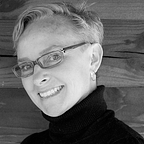Origin story: Mad Implementers, unite!
The Mad Implementers’ Salon was the seed of an idea and a desire for candid conversation, planted in Marrakech Morocco in December 2022.
A group of implementers came together at a conference on Social and Behaviour Change, to start what we hoped would be a series of practical discussions across organizations, mindsets and geographies.
The only “inclusion criteria” for contributing to the first and subsequent “Mad Implementer” conversations is a tolerance for a touch of madness, some experience working in social change, a desire to learn, and an ability to cut through the bullsh*t and flag-waving when sharing ideas or asking questions.
In Marrakech, we explained that by “madness” we were thinking about ideas, approaches and working contexts we were mad about — whether mad-crazy, madly in love or mad-angry.
Six of us convened the first conversation. We were working in several organizations, or for ourselves, on four continents. We had several types of madness among us. In a stuffy-but-lively conference room in Marrakech, the six of us got the conversation started, with many diverse contributions from conference participations to follow.
- Sarah Osman shared her love for Behavioural Science, showcasing how it can be adapted for the global South. She shared a folder of resources, and suggested we think about new tools like “Behaviour Maps.” Click here for additional reflections from Sarah.
- Nicole Grable was fuming mad about vaccine-related misinformation. She proposed that we think more about “trust” (in governments, in vaccines). She reflected on the power of community-led approaches and the value of listening and learning from communities;
- Hana Banat was positively mad about multi-sectorality — She asked us to consider “twinning” the serious (reproductive health) with the less serious (games and sports);
- Charles Kakaire declared his adoration for private sector approaches that use emotion and delight in the promotion of products and services. He urged us to invest more in strengthening systems and services (“It is easier to ‘create demand’ when you have good service,” he observed);
- K. P. Greiner joined Nicole in the “angry-mad” category, describing a perceived failure of public health practitioners to learn during disease outbreaks. “If arrogance is our disease, how can we interrupt transmission?” She asked.
- Antje Becker Benton was the lead facilitator, inviting session participants to join the discussion and the semi-circle of mad speakers. She kicked things off by asking: “When do implementers get to exchange their candid thoughts about social change intervention designs, methods, successes, flops and failures?”
Session participants had plenty to contribute. There was a groundswell of support for collaborating with the private sector. Others were less convinced. Many observed that we do not speak enough about failure. Someone mentioned Fail Festivals, and their sassy cousin: F*ck Up Nights. Discussion ensued. The enthusiasm for Fail Fests was followed by some bemoaning of multiple “lacks” (lacks of courage, of learning and of self-reflection.) A “passing fad” label was briefly applied to both Behavioural Science and Human Centered Design, with many then rallying to the defense of one (or both) of these approaches.
We concluded the session with an invitation to participate in a future discussion series, which we were calling at that time (and still now): “The Mad Implementers’ Salon.”
Our quarterly online exchange series for social change practitioners and is partly inspired by the excellent “Technology Salons” co-organized by Linda Raftree and Wayan Voto. We’ll adopt the same Chatham House rules as the Tech Salon, and we particularly like the first of their four principles: “Conversation, not presentation” (This means creating a forum for discussion where “presentations are discouraged and Power Point is generally banned.”)
Our first session, which was held on May 18th, had this title: “Behavioural Science: Whose science is it anyway?” (Criticisms, proposals and applications in the Global South). We wrote a short synthesis of the session and included the slides in a separate essay — click here to access.
We invited anyone who is interested in social change, learning, solidarity and frank discussion to join us for the inaugural session (or the next one!).
We welcome suggestions, new ideas, proposals for future sessions, or anything else you would care to share. You can leave a comment below, and there is this “anonymous and open survey” that is also available.
[V3: updated 26 May 2023]
